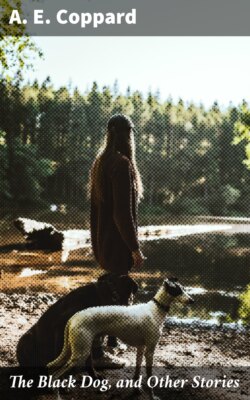Читать книгу The Black Dog, and Other Stories - A. E. Coppard - Страница 8
На сайте Литреса книга снята с продажи.
V
ОглавлениеTable of Contents
For a day or two longer time resumed its sweet slow delightfulness, though its clarity was diminished and some of its enjoyment dimmed. A village woman came to assist in the mornings, but Orianda was now seldom able to leave the inn; she had come home to a burden, a happy, pleasing burden, that could not often be laid aside, and therefore a somewhat lonely Loughlin walked the high and the low of the country by day and only in the evenings sat in the parlour with Orianda. Hope too was slipping from his heart as even the joy was slipping from his days, for the spirit of vanished Lizzie, defrauded and indicting, hung in the air of the inn, an implacable obsession, a triumphant forboding that was proved a prophecy when some boys fishing in the mill dam hooked dead Lizzie from the pool under the hornbeam tree.
Then it was that Loughlin’s soul discovered to him a mass of feelings—fine sympathy, futile sentiment, a passion for righteousness, morbid regrets—from which a tragic bias was born. After the dread ordeal of the inquest, which gave a passive verdict of Found Drowned, it was not possible for him to stem this disloyal tendency of his mind. It laid that drowned figure accusatively at the feet of his beloved girl, and no argument or sophistry could disperse the venal savour that clung to the house of “The Black Dog.” “To analyse or assess a person’s failings or deficiencies,” he declared to himself, “is useless, not because such blemishes are immovable, but because they affect the mass of beholders in divers ways. Different minds perceive utterly variant figures in the same being. To Brown Robinson is a hero, to Jones a snob, to Smith a fool. Who then is right? You are lucky if you can put your miserable self in relation at an angle where your own deficiencies are submerged or minimized, and wise if you can maintain your vision of that interesting angle.” But embedded in Loughlin’s modest intellect there was a stratum of probity that was rock to these sprays of the casuist; and although Orianda grew more alluring than ever, he packed his bag, and on a morning she herself drove him in the gig to the station.
Upon that miserable departure it was fitting that rain should fall. The station platform was piled with bushel baskets and empty oil barrels. It rained with a quiet remorselessness. Neither spoke a word, no one spoke, no sound was uttered but the faint flicking of the raindrops. Her kiss to him was long and sweet, her good-bye almost voiceless.
“You will write?” she whispered.
“Yes, I will write.”
But he does not do so. In London he has not forgotten, but he cannot endure the thought of that countryside—to be far from the madding crowd is to be mad indeed. It is only after some trance of recollection, when his fond experience is all delicately and renewingly there, that he wavers; but time and time again he relinquishes or postpones his return. And sometimes he thinks he really will write a letter to his friend who lives in the country.
But he does not do so.
